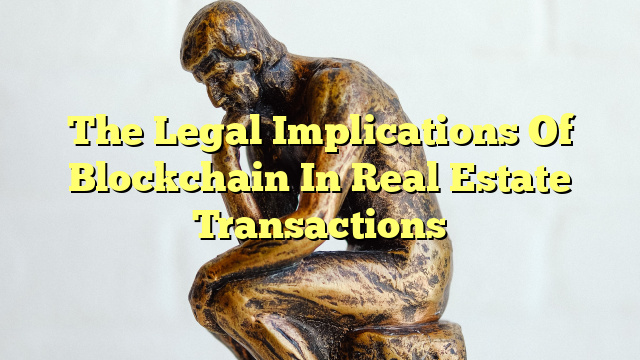Table of Contents
Legal Issues with Blockchain
Blockchain technology has the potential to revolutionize many industries, including real estate. However, it also brings about several legal challenges that need to be addressed.
One of the main legal issues with blockchain is the question of ownership. With traditional real estate transactions, ownership is established through a series of legal documents and contracts. However, with blockchain, ownership can be recorded on a decentralized ledger, which may not be recognized by existing legal systems.
Another legal issue is the question of jurisdiction. Blockchain operates on a global scale, which can make it difficult to determine which jurisdiction’s laws apply in a particular transaction. This can lead to conflicts and legal uncertainties.
Additionally, privacy and data protection are major concerns with blockchain. As transactions are recorded on a public ledger, there is a risk of personal information being exposed. This raises questions about compliance with data protection regulations and the right to be forgotten.
Overall, the legal issues with blockchain in real estate require careful consideration and the development of new legal frameworks to ensure the technology can be effectively and legally implemented.
Effect of Blockchain on Real Estate
Blockchain has the potential to greatly impact the real estate industry in several ways.
One of the main effects of blockchain is the increased transparency and efficiency it can bring to real estate transactions. By recording transactions on a decentralized ledger, it reduces the need for intermediaries and streamlines the process. This can result in faster transactions and lower costs.
Blockchain can also improve the security of real estate transactions. As transactions are recorded on a tamper-proof ledger, it reduces the risk of fraud and forgery. This can provide greater trust and confidence in the real estate market.
Additionally, blockchain has the potential to enable fractional ownership of real estate. Through tokenization, properties can be divided into smaller units, allowing for greater liquidity and investment opportunities.
Overall, the effect of blockchain on real estate is expected to be transformative, bringing about greater efficiency, transparency, and security to the industry.
Legal Regulations for Blockchain
As blockchain technology continues to evolve, legal regulations are being developed to address its use in various industries, including real estate.
One of the main areas of regulation is data protection and privacy. As blockchain involves the recording of transactions on a public ledger, there is a need to ensure compliance with data protection regulations, such as the General Data Protection Regulation (GDPR) in the European Union.
Regulations are also being developed to address the question of jurisdiction and legal recognition of blockchain transactions. This includes determining which jurisdiction’s laws apply and establishing legal frameworks for smart contracts.
Furthermore, regulatory bodies are exploring the use of blockchain in real estate transactions, including the recording of property titles and the verification of ownership. This involves collaboration between government agencies, industry stakeholders, and legal experts.
Overall, legal regulations for blockchain in real estate are still evolving, and it is important for stakeholders to stay informed and comply with the latest developments.
Legal and Ethical Issues in Blockchain
In addition to the legal challenges, blockchain also raises ethical issues that need to be considered.
One of the main ethical concerns is the question of trust. While blockchain technology can provide greater transparency and security, it also raises questions about trust in the system. As transactions are recorded on a decentralized ledger, it relies on the integrity of the network and the consensus mechanism.
Another ethical issue is the potential for discrimination and bias in blockchain systems. As algorithms and smart contracts are developed, there is a risk of perpetuating existing biases and inequalities. This raises

